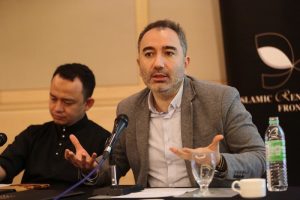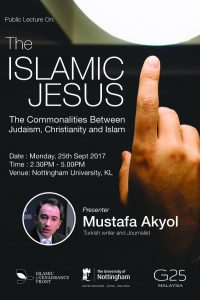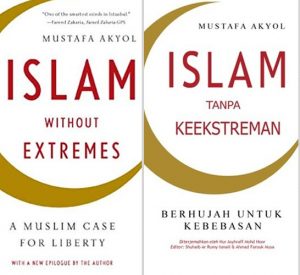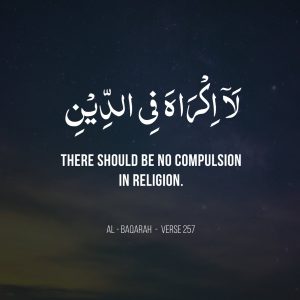The Consequences of Speaking Out Against Religious Illiberalism in Malaysia
Anyone who can liberate the Malay Muslim mind is a dangerous threat. That is why the authorities had to censure Mustafa Akyol. They detained him, interrogated him and made his immediate future uncertain.
–Mariam Mokhtar, Malaysian journalist, Oct 2017
 On September 21, 2017, I took the very long journey from the small town of Wellesley, Massachusetts, to Kuala Lumpur, the capital of Malaysia, with no clue about what awaited me in this far end of the world.
On September 21, 2017, I took the very long journey from the small town of Wellesley, Massachusetts, to Kuala Lumpur, the capital of Malaysia, with no clue about what awaited me in this far end of the world.
At that time, I was a visiting fellow at the Freedom Project at Wellesley College—an initiative aimed at cherishing classical liberal values, such as freedom of speech within American academia. What took me to Malaysia was also a liberal initiative, albeit one that operated within a very different milieu. Named Islamic Renaissance Front, or IRF, this was a small but vocal organization founded by faithful Malay Muslims who challenged the oppressive and intolerant interpretations of Islam in their country—with arguments from Islam itself.
My acquaintance with the IRF had a history. The organization had hosted me in Malaysia three times before, organizing seminars at universities, institutes, and other public venues. In 2016, it also published the Malay version of my 2011 book, Islam Without Extremes: A Muslim Case for Liberty. The founding leader of IRF, Dr. Ahmad Farouk Musa, was energized with the attention Malay Muslims were giving to foreign voices like mine. He just had a concern with the “Inquisition,” the seriousness of which I had not yet grasped.
On this trip, the first event on my schedule was a panel on how rational theology and philosophy flourished in early Islam and how their later decline marked an “intellectual suicide” that still haunts us—as we shall also see in this book. To an attentive audience, I argued that we Muslims need to revisit some of the ideas that have been banned to us as “heresy” for about a thousand years.
The next day, at another public venue in Kuala Lumpur, I spoke at the second panel on my schedule, which probed a sensitive topic: apostasy from Islam. It is a sensitive topic, because while you may think that anybody has the right to change his or her religion, quite a few Muslims believe that if the abandoned religion is Islam, the apostate deserves a death penalty. This punishment is applicable in about a dozen “Islamic” states, such as Saudi Arabia or Iran, where Malaysians are proudly more “moderate.” So, instead of executing the apostates, they send them to rehabilitation centers, where people can be held for six months, so that they can be “educated” and “corrected.”
In my speech, I argued that apostates should be neither executed nor “rehabilitated,” but just left alone with their conscience. I referred to Islamic scholars who have reformist views on this matter, and also I reminded my audience of a Qur’anic phrase: La ikraha fi al-din, or “There is no compulsion in religion.” Yes, apostasy was condemned as a capital crime in classical Islamic law, I explained, but this only reflected the medieval norms according to which leaving the religious community also implied political treason. Times have changed, I noted, and our laws and attitudes must change as well.
In the same speech, I also added that if a Muslim loses faith in the religion, dictates would achieve nothing. For faith is a sincere conviction in the heart and mind that cannot be imposed from the outside. “Faith,” I emphatically said, “is not something you can police.”
Well, speak of the devil, as the saying goes, and he shall appear.
As the panel ended and I was getting ready to leave, a group of serious-looking men approached me. “Are you Mustafa Akyol?” asked one of them. I said, “yes,” wondering who he was. “As-salamu alaykum,” the man said. “We are the religion police.” Then he showed me his card, which defined his job really as “religion enforcement officer.”
The officers just wanted to “ask a few questions.” Supposedly, they had heard “complaints” about my speech, and now they were to investigate what I had said. “We got the recorded video of your talk,” the senior officer said. “We will watch it and then inform you about the next step.” He also asked me if I really quoted the Qur’anic phrase “There is no compulsion in religion”? I affirmed, “yes,” wondering why that could be a problem.
 The officers also noted that they didn’t like my lecture planned for the next day—a conversation on my more recent book, The Islamic Jesus: How the King of the Jews Became a Prophet of the Muslims. Apparently the problem was the event’s subtitle, which read, “Commonalities Between Judaism, Christianity, and Islam.” “We don’t like that kind of stuff,” the senior officer plainly told me, making me recall the obsession in the country of drawing sharp boundaries between Abrahamic religions—to the absurd extent of banning Christians from using the word “Allah,” which Arab Christians have used for centuries without any question.
The officers also noted that they didn’t like my lecture planned for the next day—a conversation on my more recent book, The Islamic Jesus: How the King of the Jews Became a Prophet of the Muslims. Apparently the problem was the event’s subtitle, which read, “Commonalities Between Judaism, Christianity, and Islam.” “We don’t like that kind of stuff,” the senior officer plainly told me, making me recall the obsession in the country of drawing sharp boundaries between Abrahamic religions—to the absurd extent of banning Christians from using the word “Allah,” which Arab Christians have used for centuries without any question.
Then, after this short interrogation, the religion police let me go, and I thought that was it.
The next morning, however, I woke up in my hotel room to read in the Malay media that I had been summoned to their headquarters—to the government ministry called Federal Territories Islamic Affairs Department, or, shortly, JAWI. My hosts suggested that we should cancel my last lecture and I should leave the country as soon as possible, to deal with JAWI’s questions through a lawyer and from afar. Following this advice, I packed my bags, bought souvenirs for my wife, and headed to the Kuala Lumpur International Airport. Around 8 pm, I checked in and got my boarding pass. When I arrived at the passport control area, however, I realized that my adventure in Malaysia wasn’t yet over.
A VISIT TO THE “INQUISITION”
The female officer who looked at my passport turned a bit nervous when she put my name in her computer. “You need to wait, sir,” she said. She then called some police officers, who called other police officers, who soon escorted me to the police unit at the airport. There I learned that JAWI had issued a nationwide arrest order for me, to make sure I didn’t leave the country.
That was the beginning of a very long night. I was taken from the airport to a nearby police station, then to another official building, going through sluggish processes and also long distances around the unfamiliar Malay capital. Finally, toward 5 am, I was taken to the JAWI headquarters, where I was locked up in a detention room. No one was rude or harsh toward me, but the many unknowns were nevertheless distressing. I kept thinking about my children and my wife, who had given birth to our second son just weeks before my arrival in Malaysia.
In the morning, around 8 am, my door was unlocked and I was told that we were heading to the “Sharia court.” Finally, after another long drive and some waiting, I entered the court, which must have been the “Inquisition” that Dr. Musa had been talking about. I found two young veiled female officers sitting next to an older religious scholar with a long beard—a Hakim Syarie, or “Sharia Judge.” For two hours, they questioned why I came to Malaysia, who “abetted” me, and why I did not seek “permission” from the authorities in order to “teach Islam.” They were respectful, but also stern. And, astonishingly, they asked again with what authority I quoted the Qur’anic phrase “There is no compulsion in religion.”
Finally, there came the happy ending to this dark episode. I rejoiced to hear the sentence “We will release you.” “This is a lesson,” added one of the female officers, “so don’t come back to Malaysia again and teach Islam without permission.”
Soon, after eighteen hours under detention, I was let go. The first thing I did was call my wife, Riada. From her, I learned that what saved me was not mere luck. After Dr. Musa notified her of my arrest via phone, she immediately called Istanbul to alarm my father, Taha Akyol, who is a prominent Turkish public intellectual. He sought help from a few of his influential friends, the most prominent of which was Abdullah Gül, Turkey’s former president and a rare Muslim liberal democrat. Mr. Gül’s Istanbul office immediately got in touch with the office of His Royal Highness Sultan Nazrin Shah, a key ruler in Malaysia’s complex federal monarchic system. The Sultan’s advisor, Dr. Afifi al-Akiti, a scholar at Oxford University, soon contacted the court’s officials. Whatever was said apparently worked. Hours later, Dr. al-Akiti even kindly escorted me to my plane, on which this time I boarded without any trouble.
 Yet still, days after my departure, the Malaysian government banned my book Islam Without Extremes along with its Malay edition, Islam Tanpa Keekstreman. The decision was announced by then deputy prime minister Ahmad Zahid Hamidi, who said the book was “not suitable to the societal norms here.” That initiated a long legal process, as the Islamic Renaissance Front went all the way up to the nation’s High Court to get the books unbanned. But in April 2019, the High Court upheld the government’s prohibition. In return, the Cato Institute in Washington, D.C., which I joined in September 2018 as a senior fellow focusing on Islam and modernity, offered the Malay edition of the book for free, soon to be downloaded by thousands of Malay readers. The Malaysian authorities were not giving up, so we would not give up, either.
Yet still, days after my departure, the Malaysian government banned my book Islam Without Extremes along with its Malay edition, Islam Tanpa Keekstreman. The decision was announced by then deputy prime minister Ahmad Zahid Hamidi, who said the book was “not suitable to the societal norms here.” That initiated a long legal process, as the Islamic Renaissance Front went all the way up to the nation’s High Court to get the books unbanned. But in April 2019, the High Court upheld the government’s prohibition. In return, the Cato Institute in Washington, D.C., which I joined in September 2018 as a senior fellow focusing on Islam and modernity, offered the Malay edition of the book for free, soon to be downloaded by thousands of Malay readers. The Malaysian authorities were not giving up, so we would not give up, either.
“NO COMPULSION”—AND ITS LIMITS
What was it that alarmed the Malay authorities so much about my message? That question was in my mind right from the moment I was let go by the religion police. While seeking an answer, I recalled the bizarre detail in the interrogation: that they were annoyed at me for quoting the Qur’anic phrase “There is no compulsion in religion.” It is in a longer verse of the Qur’an, which, in its entirety, reads as follows:
There is no compulsion in religion: true guidance has become distinct from error, so whoever rejects false gods and believes in God has grasped the firmest hand-hold, one that will never break. God is all hearing and all knowing.
While this verse has always been present in the Qur’an, the short clause at its very beginning took a life of its own in the modern era, providing a universal motto for liberal-minded Muslims. For in just a few simple words, it seemed to rule out any coercion in religious matters. True, the rest of the verse moved on to renounce “false gods” and to proclaim monotheism as “true guidance.” That is what religions do: they make a truth claim. But this truth claim remarkably came with a proclamation of “no compulsion,” or, in other words, freedom.
However, not all Muslims liked this Qur’anic freedom. I had seen some Saudi translations curtail it by inserting a few extra words, in parentheses, into the “no compulsion” phrase. When I checked the website of JAKIM, the Malaysian Department of Islamic Development, I found out the same thing. The “no compulsion” phrase was written like this:
 There shall be no compulsion in religion (in becoming a Muslim).
There shall be no compulsion in religion (in becoming a Muslim).
This little insertion in parentheses had huge consequences, for it reduced the “no compulsion” clause merely to allowing non-Muslims to stay outside of the faith. Those who are already Muslim, however, had no right to leave. They were also subject to coercion in the practice of the faith. This little stroke of a pen, in other words, gave the religion police its very authority to dictate Islam—the very authority I had challenged.
Yet, to be fair, this little stroke of a pen was also not unwarranted, because the “no compulsion” clause in fact had a limited meaning in the eyes of the premodern exegetes of the Qur’an, who built the mainstream Islamic tradition. Some argued that the verse was simply about a specific historic incident without any broader implications. Others suggested that the verse was only about not forcing Christians and Jews to accept Islam, but nothing more. Some even held that the “no compulsion” clause was “abrogated” by other verses of the Qur’an, which commanded war against “those who do not believe in God or in the Last Day.” Forcing people to accept Islam “with the sword” does not even count as compulsion, some also argued, because it is only for their own good.
Moreover, a hadith, a saying attributed to the Prophet Muhammad, peace be upon him, further marginalized the spirit of the verse. “Whoever changes his religion,” it bluntly read, “kill him.” Whether the Prophet of Islam really said this is a good question we will probe in later chapters. But classical scholars took it at face value, reaching a “consensus,” or ijma, that the apostate must be executed—only after being given a few days to recant.
That is why the Malaysian authorities weren’t totally making things up by “editing” the translation of the “no compulsion” clause in order to limit its scope to only those who aren’t Muslim yet. They had the whole weight of the Islamic tradition behind them. In return, liberal Muslims like myself were pushing for something new.
A MATTER OF ENLIGHTENMENT
This story is not meant to discredit Malaysia. It is a beautiful country for which I still have a heart, a country that I would encourage anyone to visit. I also feel lucky that I had this experience there—and not in countries with much harsher laws, such as Saudi Arabia or Iran. Malaysia is indeed more “moderate” when compared to such religious dictatorships, where liberal critics can go through much darker experiences.
The problem isn’t about Malaysia, though. It is not about any other specific country, either. It is about an interpretation of Islam that is, by modern standards, authoritarian and intolerant. It manifests itself in laws and institutions that force women to cover their heads, or consider them lesser than men. It jails, flogs, or kills people for criticizing Islam and for even offering alternative interpretations of it. It demonizes Christians, Jews, and others, or even fellow Muslims who happen to be from a different sect.
Mind you: this is a separate problem from terrorism in the name of Islam, as practiced by armed groups such as ISIS, Al-Qaeda, or Boko Haram. Those terrorists are really “extremists,” in the sense that their wanton violence, which targets many fellow Muslims, as well, finds a very marginal support in the Muslim world. The problem of religious illiberalism, however, is not marginal. Suffice it to say that more than 60 percent of all Egyptians or Pakistanis believe that apostates must be executed or adulterers must be stoned.
In the West, especially in the past few decades, this problem has attracted a great deal of attention, but its nuances often get lost in the tug-of-war between two opposite camps.
On one side, there are the apologists, who argue that there is simply no problem within Islam today. There are only a handful of extremists, they say, whose zealotry has “nothing to do with Islam.” They often have the good intention of defending Muslims from bigotry, but they do this by deflecting attention from real problems.
On the other side, there are Islamophobes, who cherry-pick all the problems within Islam today in order to depict the entire religion in darkest terms. They not only draw an unfair picture of the reality but also promote bigotry against Muslims, which helps only deepen the problem at hand.
 So a more fair take on Islam is necessary, which can be helped greatly by a historical and comparative perspective. Islam is the last of the three great Abrahamic religions, and most problems we see in it today have also been present in the other two—Judaism and Christianity. The history of the latter, in particular, includes many episodes of coercion and violence in the name of God. It was only a few centuries ago that “heretics” or “witches” were burnt alive in Europe, and Catholics and Protestants shed each other’s blood. In those premodern times, Islam in fact proved to be a more lenient religion. That is why Sephardic Jews migrated to Muslim lands in 1492 to flee the persecution of Catholic Spain. That is why French philosopher Jean Bodin (d. 1596), who pleaded for religious tolerance, praised “the great emperour of the Turks,” who “permitteth every man to live according to his conscience.”
So a more fair take on Islam is necessary, which can be helped greatly by a historical and comparative perspective. Islam is the last of the three great Abrahamic religions, and most problems we see in it today have also been present in the other two—Judaism and Christianity. The history of the latter, in particular, includes many episodes of coercion and violence in the name of God. It was only a few centuries ago that “heretics” or “witches” were burnt alive in Europe, and Catholics and Protestants shed each other’s blood. In those premodern times, Islam in fact proved to be a more lenient religion. That is why Sephardic Jews migrated to Muslim lands in 1492 to flee the persecution of Catholic Spain. That is why French philosopher Jean Bodin (d. 1596), who pleaded for religious tolerance, praised “the great emperour of the Turks,” who “permitteth every man to live according to his conscience.”
Things began to change dramatically, however, with the Age of Enlightenment and its brightest creation: liberalism. New values, such as freedom of speech, freedom of religion, or equality before law, emerged, establishing a sense of human rights unmatched in any premodern civilization. Compared to them, the norms of the Islamic civilization looked growingly archaic.
To be sure, since the 19th century, some Muslims have taken significant steps to catch up. Recently, British historian Christopher de Bellaigue has summarized these efforts as the “Islamic Enlightenment.” Yet this very drive—including its authoritarian strains—provoked “Islam’s counter-Enlightenment.”
This is a reaction spearheaded by those whom scholar Khaled Abou El Fadl calls “puritans”—a wide range of Salafis, Islamists, and rigid conservatives—who act as the defenders of the Islamic orthodoxy against modern liberal values. For worse, they are often more assertive than the orthodoxy itself, due to both their reactionary nature and the newfound powers of the modern bureaucratic state.
Reopening Muslim Minds is meant to be an intervention into this big crisis of Islam. It aims to help advance the Islamic Enlightenment, by presenting a comprehensive argument for it—and, perhaps more importantly, by dismantling the theological roadblock that obstructs it.
 Mustafa Akyol is a regular contributing opinion writer for The New York Times since 2013, covering matters of Islam in the modern world. His earlier books, Islam without Extremes (2011) and The Islamic Jesus (2017), have been reviewed and praised by The New York Times, The Wall Street Journal, Financial Times, and the Economist. Islam without Extremes was long-listed for the 2012 Lionel Gelber Prize literary prize, while being banned in Malaysia for challenging the “religion police.” This article was first published in the Literary Hub at: https://lithub.com/the-consequences-of-speaking-out-against-religious-illiberalism-in-malaysia/
Mustafa Akyol is a regular contributing opinion writer for The New York Times since 2013, covering matters of Islam in the modern world. His earlier books, Islam without Extremes (2011) and The Islamic Jesus (2017), have been reviewed and praised by The New York Times, The Wall Street Journal, Financial Times, and the Economist. Islam without Extremes was long-listed for the 2012 Lionel Gelber Prize literary prize, while being banned in Malaysia for challenging the “religion police.” This article was first published in the Literary Hub at: https://lithub.com/the-consequences-of-speaking-out-against-religious-illiberalism-in-malaysia/